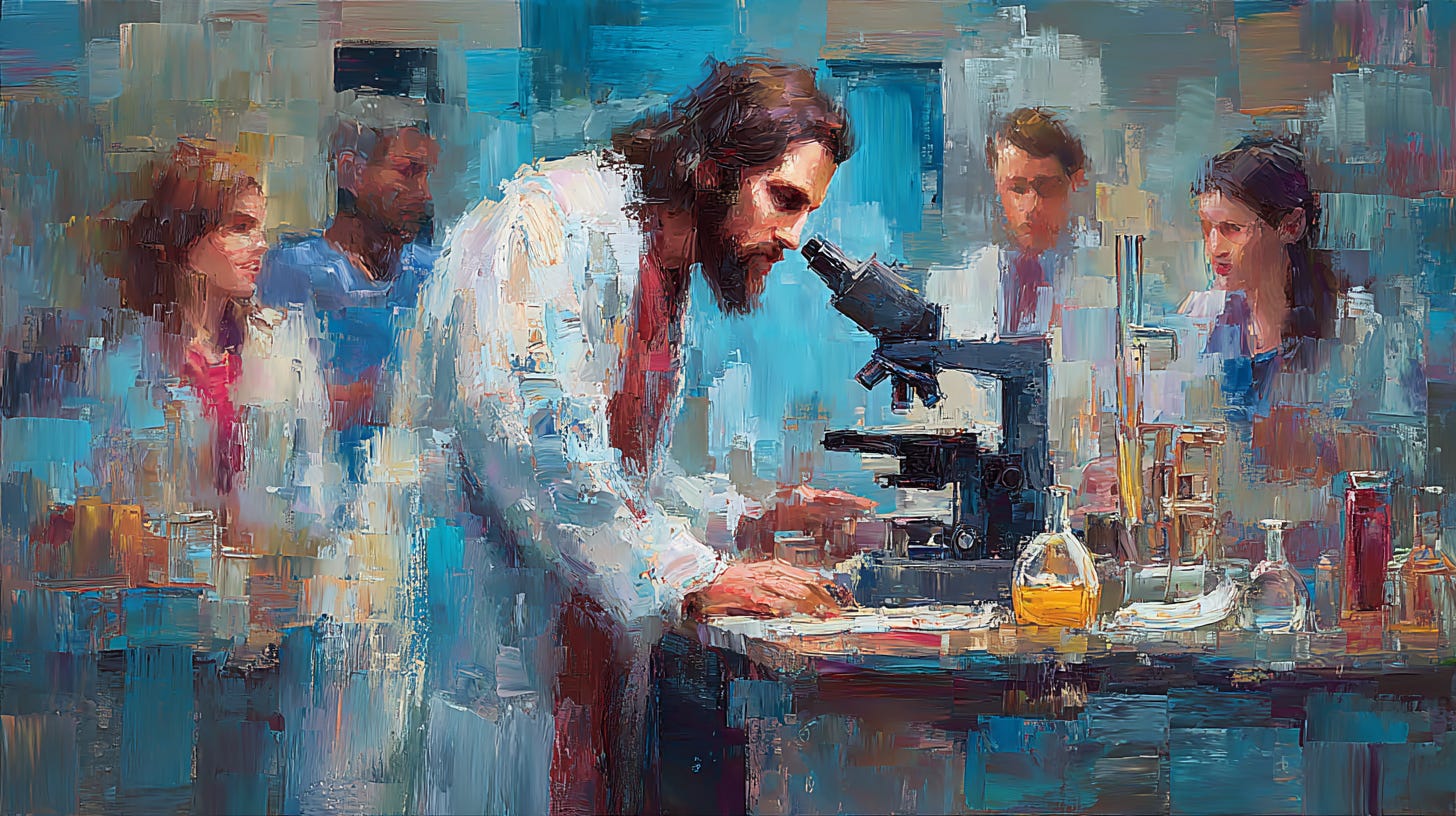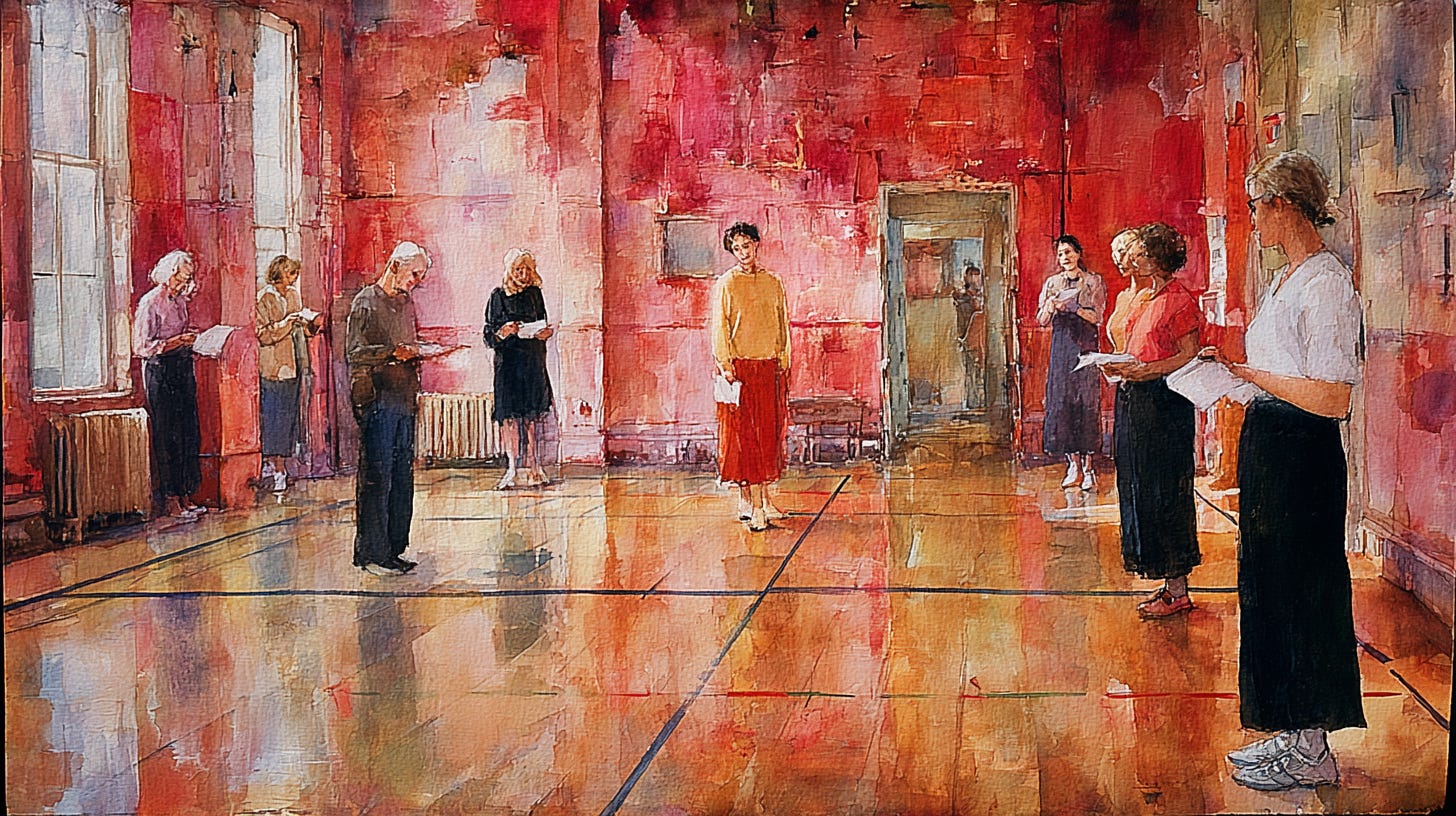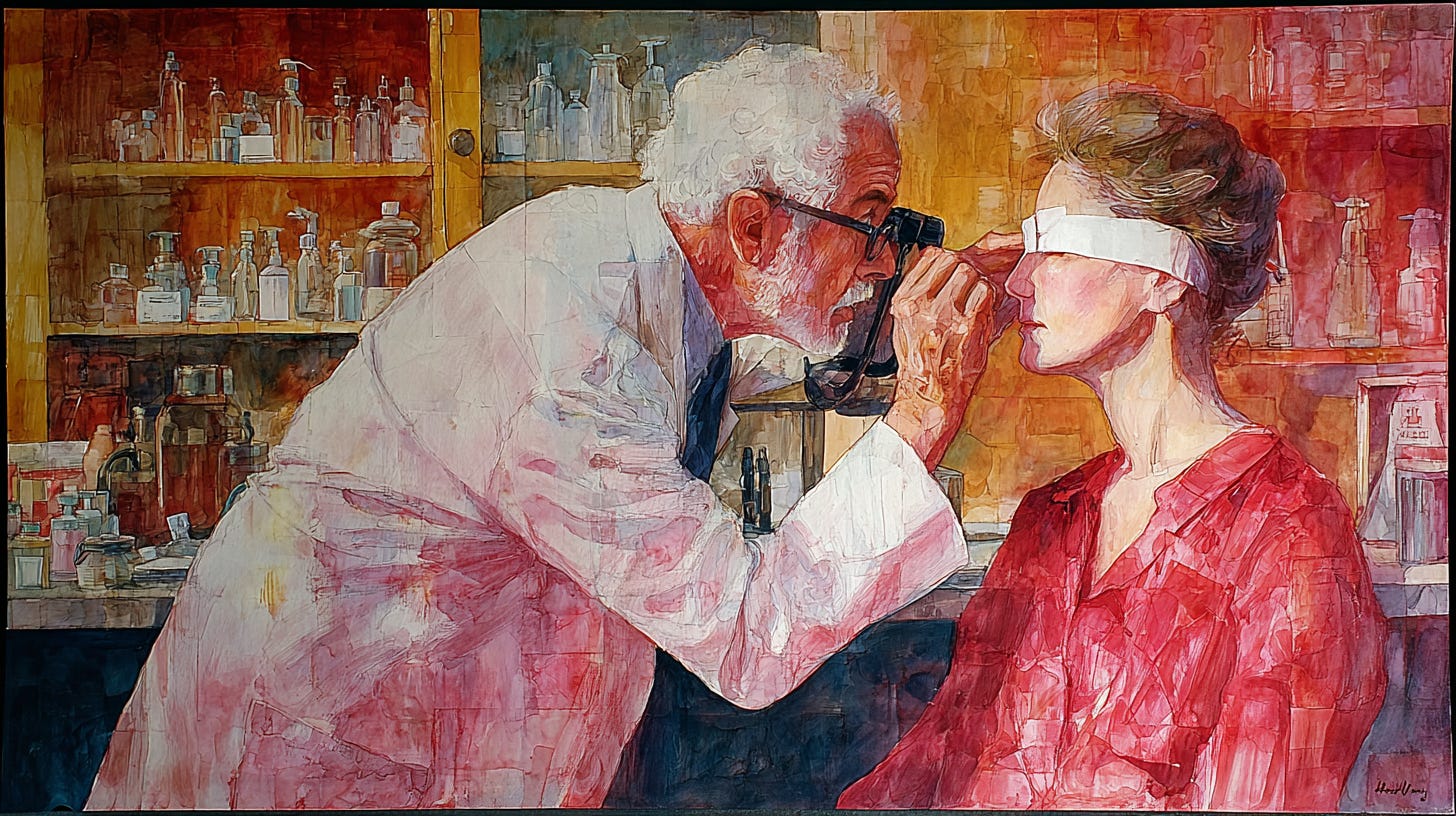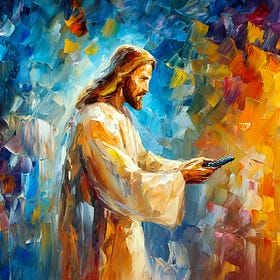God is not a lab project.
Part II — God makes Himself known.
[ A rapid-fire summary of Part I. ]
God doesn’t send us data about Himself; He gives Himself. His self-revelation is personal, Jesus-shaped, and it reconciles us. It doesn’t hover above us as information; it comes near as presence. That’s why the graduate dissertations, the arguments, the proofs all take their proper place: they can witness, but they cannot embrace. An arms-length evaluation of Jesus won’t land us at His feet. Knowing God is communion, not mental mastery, and the Spirit draws us into that communion. This knowing unfolds slowly: God patiently formed a people, from a promise in Abraham’s tent, through Israel’s covenants, worship, and prophets, so that, in the fullness of time, we could recognize the One who came. There is no God behind Jesus Christ. In Him, God fully and finally gives Himself to be known.
Now, Part II asks the next necessary question: if God isn’t one more thing in the universe, how is He found? The usual tools for finding things won’t work. Now we’ll explore why only God’s own move toward us makes knowing Him possible, and why that knowing must be mediated by Him.
God is not one more thing among things.
God is not one object among many, located within the created order. He is not one thing among all the other things. Created things are finite. They are discrete. They are observable because they exist within a common field of reality that we also inhabit. We can observe a mountain. We can observe a molecule. We and they exist together within space, time, and causality.
But God… He called all things into being, including our field of reality, including the mountain and the molecule. He created it all out of nothing, not out of Himself, out of nothing!1 He is not part of it. It is not made from the stuff that is Him.2
We cannot observe God “from outside” because there is no “outside” with respect to God. We exist within the field God has created. And He is not an item in our field of vision. As such, He cannot be analyzed or investigated as we do other objects.3 He transcends the entire created order as its ground and source. This is what it means to say God is holy: He is qualitatively other.4
So, to define God as we would an object or an abstraction, as though we can stand outside of Him, and observe Him, and name Him, and attribute to Him meaning from us, as we do all other objects in the known universe, is quite utterly ridiculous.
So now what?
We know God only because He comes, and He shares His own life.
Because we are creatures, our minds, our capacities, and our language are all finite, contingent, and conditioned by created existence. And God is not part of our created frame of reference. To bridge the gap, God would have to move toward us, within our created existence, revealing Himself in ways we can receive.5
Because God is Lord, He is free and sovereign over His own self-disclosure.6 We cannot compel God to reveal Himself or force Him into a form that fits our investigative tools. If we are to know God, it will be because He has sovereignly willed to reveal Himself to us.
Because God is Father, Son, and Holy Spirit, His being is personal communion: Father knowing and loving the Son, who knows and loves the Father, in the Spirit eternally.7 Whatever a revelation of that would be for us, it wouldn’t just be “information transfer.” No information could possibly reveal to us what that relationship truly is. Therefore, revelation would have to involve sharing in His own relational life. And in such sharing, we would then know Him.
So, knowledge of God would mean participation in God’s own knowing of Himself.8 And since the Son participates fully in God’s own knowing, we would be brought into the Son’s communion with the Father through the Spirit.
December 1974, Berlin.9 In a black-box rehearsal room with tape on the floor, a bench, and copies of the script with edges worn from rehearsal, the cast is working on Waiting for Godot. This is Samuel Beckett’s famously exacting play where pauses matter as much as words. Walter Asmus, Beckett’s longtime assistant and director, is running the room. They measure silences like millimeters. They weigh commas as if a scale could read intention. It’s careful. It’s sincere. But everything belongs to the stage.
Then, a door at the back opens.
Samuel Beckett steps in—tall, collar up, quiet as a held breath. Not a memo. A person. He sits for a moment on the bench, and then stands. “Again!” he shouts. He says an actor’s name. He moves a chair we thought was fixed, He trims a gesture to almost nothing. “Less,” he instructs. He waits until the silence has a shape and then says, “Now.” The air in the room shifts. Lines we kept analyzing now show their weight by being spoken from the source himself (not explained; given). Asmus will later say that Beckett was “a central figure from the very first moment,” and the room knew it without being told.
Nothing in the script was false. It just wasn’t Beckett. The pages of script didn’t leave when Beckett walked into the room; they bow. The actors stopped hunting for the author among the props. He wasn’t one more item to study under the stage lights. He was the one from whom the work took its meaning.
They didn’t decode the script to reach him; the author entered the room and gave the script its meaning.
Not observation but participation: love reveals by giving itself.
Communion with God, then, is not from a constructed set of ideas about Him. He is not a “phenomenon” open to scientific and philosophical investigation like a star or a moral law might be. We cannot ascend these heights by study or reason.10
All our cognitive powers belong to the created order and are limited to what is accessible within it. And our fallen condition further compounds the problem. We are broken. And there is sin. And these blind and distort our apprehension of truth.11
Within this distorted apprehension, we speculate about what God might be like. It can be brilliant speculation, the kind that fills philosophical treatises. And from having done this kind of speculation for millennia, it’s hard to imagine that God actually isn’t a set of timeless attributes. We’ve come to assume that His being—His reality—is graspable in the abstract. But it is not. It cannot be.
His being is a communion of love, and although we’ve found endless ways to turn love into an abstract concept, at its most fundamental core, love is action toward, action outward, action for another. God’s being is His act of self-giving, self-revealing love as it is in His triune relationship. And now also in His acts of self-giving, self-revealing love toward us in history—in creation, in covenant, in Incarnation, in atonement, in resurrection, etc. He is only known, truly known, in His acts. God is love.12
Revelation is the act of God in which God gives Himself to us as He truly is.13 If God discloses Himself to us in accordance with His own being, it will be acts of love.
God’s self-disclosure isn’t abstract; it is actual. He reveals who He is by being who He is toward us in Christ.14 Christ is the fullest expression of His self-disclosure.
In Christ, God’s being and act are one. He gives Himself, not data.
So, in the end, God, who is love, reveals Himself, not in the delivery of information about Himself—even if it were information about His love—but in Him giving Himself to be known in person. He is personal. He isn’t revealed or known to us through a list of divine attributes. To know Him is to encounter Him, to share in His own Triune personal life, a life of pure communion. And whatever that is, only He can disclose it.
Only God can reveal Himself, and He does this not by handing us a datasheet but by drawing us into that communion.15 (Other than being drawn into that communion, we’d only ever have just information about it.) The Father sent the Son. The Son reveals the Father. And the Spirit indwells us16, and, in so doing, unites us to the Son’s own communion with the Father.
God’s self-revelation is not surface-level or abstract. It comes from the depths of who He is and reaches the depths of who we are. It isn’t informational. It is transformational. It is not information to analyze. It is communion to enter.17
Information is something that hovers above or outside us. We access it and use it. But God doesn’t reveal Himself like that. Unlike information, His Revelation is not detachable from His being. His Revelation is tied to what is real. It is tied to who He really is.
When He makes Himself known, He gives not facts about Himself; He gives Himself. There is an infinite chasm between any accessible information we believe we might have about Him on the one side, and the experience of communion with Him—and what happens to us when He gives Himself to be known as He actually is—on the other side.
God doesn’t have non-essential actions. He doesn’t have some actions that reveal Him and others that don’t. There is no duplicity. There’s no gap between who God is and what God does. No acts of God are just something He’s doing on the side that aren’t really Him.18
All of His actions flow from His very being. All that God does toward us—in Revelation, in redemption—is a direct expression of who He eternally is. So his Revelation, his disclosure toward us, is never symbolic, or informational, or abstract; it is real. God is what He does. God gives Himself to be known.
Christ bridges the chasm and heals our knowing by the Spirit.
Mediation is required. Mediation is required because we are finite. Mediation is required because we are fallen.19
There is an unbridgeable chasm between the infinite Creator and us limited creatures. The infinite-finite divide has little to do with quantity. It isn’t that we are small and He is big, as though He is a being among beings, just an infinitely bigger one. It is that He is qualitatively other.20
He is the source of all being, outside of all human frames of reference, entirely inaccessible on our terms.
It’s not that we lack data or that our data is insufficient. It’s that our mode of knowing is inherently creaturely, and God in His essence is not comprehensible on our terms.21 His essence is not an object in the created order.
However, God is not a prisoner of His mystery; He is the Lord of it. He can and does make Himself known. While His essence is not an object in the created order, His self-revealing acts are. We can truly know God in His acts, above all, in Jesus Christ,22 the eternal Son who is of one being with the Father. This self-giving in Jesus Christ is not abstract or impersonal; it is real, and it is sufficient for communion. Though we cannot comprehend God in His essence, the incomprehensible God has made Himself truly and personally known in the person and action of Jesus Christ.
But there is still a problem. We’re broken. Horribly so. If God makes Himself known in Jesus Christ, we won’t see it. The light will shine, but we will not comprehend it.23 The problem is not with God’s self-revelation; it is with us.
Little Rock. Jodi Shull is an artist who loves color. But her mornings have become a gray hush. “Nothing was sharp,” she says. “It was as if every color had gray poured into it.” Her watercolor paintings stalled on the table. She stopped driving at night because of the glare. You don’t notice when it happens slow. But it takes the world with it.
Her ophthalmologist at UAMS, Romona Davis, names her problem: cataract. And with that, the work Jodi cannot do for herself is done for her. First, there is bright surgical light; then none. A small shield is put over the eye. There are eye drops. There is waiting.
Evening comes. And the bandage is peeled back.
“By that evening, I could tell a huge difference in brightness,” Jodi says. She looks around her own home like it’s been returned. “I have paintings all around my home, and that night I could see the colors again.” The lemon on the counter is reckless yellow. The reds are not memory; they are red. Joy comes out as energy; there are twelve finished projects in a the first week. The room hasn’t changed; she has.
Later, she tries to explain the drift that almost went unnoticed: “You don’t realize it because it’s such a slow and gradual change.” Then the fix, and the world is given back.24
The light was never failing; she needed new eyes.
Sin was never just a little ding we can Bondo and paint over. Sin has always been a complete and unretractable leap in a direction back toward the nothingness out of which we were created. By definition, any action against God, the giver and sustainer of life, could only be in that direction.
Sin shattered everything: every neuron, synapse, axon, nucleotide, gene, protein-folding pattern, chromosome, membrane receptor, heartbeat rhythm, retinal rod... And so our mind, thoughts, desires, volition, identity, embodiment, personhood, responsiveness, vitality, movement, perception... It’s all fundamentally disordered.
I don’t think we have any idea just how shattered we are.
In our alienated and broken state, we do not have within us the capacity to rightly know God. We can’t help but suppress and distort the truth. Any possibility of knowing God must be healed into existence by God Himself.25
So there’s a lot that’s needed here. Healing is required. Seeing is required. Understanding is required. Reconciliation is required. The real experience of restored communion is required.
And, so, in His love for us, God begins all of this work with an unsuspecting man named Abraham. And it culminates at just the right moment, at the fullness of the Incarnation, Cross, Resurrection, and Ascension, in the person of Jesus Christ,26 2000 years later.
In Jesus Christ, God bridges the chasm, both from His side and from our side. From His side, by crossing the chasm and coming to us, God as man, in the man Jesus Christ. And from our side, by assuming in Christ our broken humanity, and by assuming it fully, healing it from deep within27 at the core of our being, and offering the perfect human response on our behalf back to God. And through the Spirit of Christ, who can now take up residence in our perfectly healed and lived humanity, we can share in the communion that the Son enjoys with the Father, and in so doing, come to know Him.28
You’re reading Part 2 in a series about how God makes Himself knowable. If He’s not one more thing among things, then only His move toward us opens the way. And He has moved. Next, we trace the road He chose: a promise under stars in Abraham’s tent, smoke from altars, the ache of exile and the fire of prophets, psalms and feasts, and a people taught to wait, all so that when the fullness came, we could recognize Him.
Next up, Part 3: the long schooling of Israel—how God formed the grammar for seeing the Son that would otherwise have been missed.
Creation ex nihilo: God makes from nothing. Genesis 1:1 — God creates “in the beginning.” Hebrews 11:3 — “What is seen was not made out of things that are visible.” Romans 4:17 — God “calls into existence the things that do not exist.”
The Creator is not part of creation. John 1:3 — “All things were made through him… not one thing was made without him.” Colossians 1:16–17 — All things created through and for Him; He is before all things. Psalm 33:6, 9 — He speaks, and it stands.
God cannot be put under a microscope. Job 11:7–9 — “Can you find out the deep things of God?” 1 Timothy 6:16 — God “dwells in unapproachable light.” Romans 11:33 — His judgments are unsearchable.
Holiness = qualitative otherness. Isaiah 6:3 — “Holy, holy, holy.” Isaiah 57:15 — The High and Exalted One who inhabits eternity. Exodus 3:5–6 — Holy ground before the I AM.
Revelation is God’s move toward us. Isaiah 65:1 / Romans 10:20 — “I revealed myself to those who did not ask.” John 1:14, 18 — The Word became flesh; the Son makes the Father known. Hebrews 1:1–3 — God has spoken by the Son.
God reveals in sovereign freedom. Exodus 33:19 — “I will be gracious to whom I will be gracious.” John 3:8 — The Spirit “blows where He wills.” Romans 9:16 — “It depends not on human will… but on God who has mercy.”
God’s being is communion: Father, Son, Spirit. John 17:24–26 — The Father’s love for the Son shared with believers. John 14:10–11 — “I am in the Father and the Father is in me.” Matthew 3:16–17 — Father’s voice, Son baptized, Spirit descending.
Knowing God = sharing His own knowing. 1 John 1:3 — “Our fellowship is with the Father and with his Son.” John 15:4–5 — “Abide in me… apart from me you can do nothing.” 2 Peter 1:4 — “Partakers of the divine nature” (by promise, not appropriation).
Not by reason’s ladder. 1 Corinthians 1:21 — “The world did not know God through wisdom.” 1 Corinthians 2:14 — The natural person cannot receive the things of the Spirit. Matthew 16:17 — “Flesh and blood has not revealed this to you.”
Sin disorders our knowing. Romans 1:21–25 — Futile thinking; hearts darkened; truth exchanged for a lie. Ephesians 4:17–18 — “Darkened in their understanding.” 2 Corinthians 4:4 — Minds blinded to the light of the gospel.
God is love—and acts as love. 1 John 4:8–10 — “God is love… God sent his Son.” Exodus 34:6–7 — The Lord abounding in steadfast love and faithfulness. John 3:16 — Love gives the Son.
Revelation = God giving Himself. John 14:9 — “Whoever has seen me has seen the Father.” John 1:14 — “The Word became flesh.” 2 Corinthians 4:6 — God shines “in the face of Jesus Christ.”
Christ is God’s self-revelation-in-act. Colossians 1:15, 19–20 — The Son is the image of God; God was pleased to dwell in him, reconciling. Hebrews 1:3 — The Son is the exact imprint of His nature. John 10:30 — “I and the Father are one.”
Not data, but communion—His initiative. Matthew 11:27 — No one knows the Father except the Son and anyone to whom the Son chooses to reveal him. John 6:44 — “No one can come… unless the Father draws him.” John 17:21–23 — Brought into the Son’s communion with the Father.
Sent Son, revealing Son, indwelling Spirit. Galatians 4:4–6 — God sent His Son… God sent the Spirit of His Son into our hearts. John 14:16–20 — The Spirit abides with you; “I am in my Father, you in me, and I in you.” John 1:18 — The Son makes the Father known.
Revelation transforms; it’s communion, not info. 2 Corinthians 3:18 — Being transformed as we behold the Lord’s glory. Titus 3:4–6 — Kindness appeared… renewal by the Holy Spirit. John 6:56 — “Whoever feeds on me… abides in me.”
God is what He does—no gap in His acts. Exodus 3:14 — “I AM WHO I AM” (being-in-act). John 5:19 — The Son does what He sees the Father doing. John 14:10 — “The Father who dwells in me does his works.”
Knowing God requires mediation. 1 Timothy 2:5 — “One mediator between God and men, the man Christ Jesus.” John 14:6 — “No one comes to the Father except through me.” Hebrews 8:6; 9:15 — Jesus, mediator of a better covenant… mediator of a new covenant.
The unbridgeable gap—He is qualitatively other. Isaiah 55:8–9 — “My thoughts are not your thoughts.” Psalm 113:5–6 — The High God who “stoops down.” Ecclesiastes 5:2 — “God is in heaven and you are on earth.”
Not lack of data—our mode of knowing is creaturely. 1 Timothy 6:16 — God “whom no one has ever seen.” John 1:18 — “No one has ever seen God.” Romans 11:33 — His ways “inscrutable.”
We know God in His acts—above all in Christ. John 1:14 — The Word became flesh (in history). Exodus 33:19, 22 — God’s goodness passes by and proclaims His name. 2 Corinthians 5:19 — “God was in Christ reconciling the world to himself.”
The light shines; we don’t perceive—without grace. John 1:5, 10–11 — Light shines; the world did not know him; his own did not receive him. 2 Corinthians 4:4 — Minds blinded to the light. John 3:19 — People loved darkness rather than light.
God heals our knowing into existence. Ezekiel 36:26–27 — “I will give you a new heart… put my Spirit within you.” Luke 24:45 — “He opened their minds to understand the Scriptures.” 2 Corinthians 4:6 — God shines light into our hearts.
The promise to Abraham finds its fullness in Christ. Galatians 3:8, 16 — Scripture preached the gospel beforehand to Abraham… promises to Abraham and his Seed (Christ). Luke 1:72–73 — God remembering His holy covenant with Abraham. Galatians 4:4 — “When the fullness of time had come, God sent forth his Son.”
Christ bridges the chasm—by coming and assuming us. John 1:14 — God comes to us in flesh. Philippians 2:6–8 — He humbled himself, taking human form. Hebrews 2:14–18 — He partook of flesh and blood to help the offspring of Abraham. Romans 8:3–4 — God sent His Son “in the likeness of sinful flesh” to condemn sin in the flesh. Ephesians 2:13–18 — He is our peace, bringing us near; access to the Father through one Spirit. Colossians 1:21–22 — Reconciled “in his body of flesh by his death.”
By the Spirit, we share the Son’s communion with the Father. Romans 8:15–16 — The Spirit of adoption cries, “Abba! Father!” John 17:21–23 — Sharing in the Son’s communion with the Father. 1 Corinthians 12:13 — “In one Spirit we were all baptized into one body.”





